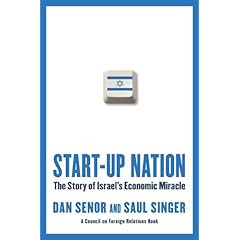
I love stumbling upon books that are completely unexpected, yet utterly relevant. Recently, I was browsing in Barnes & Noble, and picked up Start-up Nation: The Story of Israel's Economic Miracle, by Dan Senor and Saul Singer. It explains how a country "of 7.1 million, only 60 years old, surrounded by enemies, in a constant state of war since its founding, with no natural resources-- produces more start-up companies than large, peaceful, and stable nations like Japan, China, India, Korea, Canada and the UK".
Even if you are critical of Israel politically, you have to admit that its economy is worth studying. Consider these facts that the book highlights in its introduction:
- In May of 2009, Israel had over 63 companies listed on NASDAQ, the most of anyone besides the US. Canada came in second, with 48, and Japan came in third, with only 6.
- Israel's rate of venture capital investment was over $250 per person in 2008. The U.S. was second, with less than $100 per person, and Ireland was third, with over $50 per person.
However, just because we all (mostly) agree that this transition is necessary, we don't agree how to do it. Some argue that tax policy is the most important. The MEDC seems to be focused on advertising and offering special tax credits to specific companies considering coming to Michigan. Non-profits like Michigan Future, who believe talent is the crucial ingredient, are focused on improving education. Young Smart Global Lansing is a consortium of entrepreneurs taking it to the streets in a grassroots effort to get skilled college grads to stay in Michigan and start companies.
The problem is multifaceted, so there is no silver bullet. It's going to take the right leadership, the right institutions, and the right culture to make this effort successful. Most of all, we have to be willing to learn from the past, and shed dogmatic ideologies. Isn't that what innovation is all about, anyway?
I hope to contribute to the conversation by applying Israel's lessons to Michigan in case study that spans a series of blog posts. Obviously, the goal isn't to duplicate Israel - that's impossible. However, we can clarify our understanding of the universal elements of a dynamic, knowledge-based economy, and hopefully apply them to Michigan's particular circumstance.
P.S. - If you want to remember to read the rest of this series, but are busy and prone to forget (like me), why don't you subscribe to the RSS feed or get updates by e-mail?
